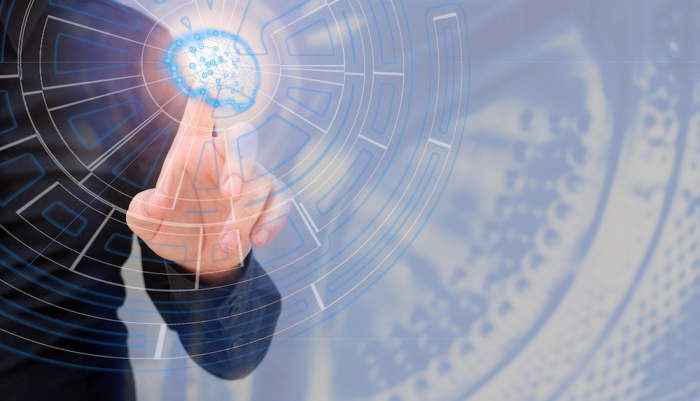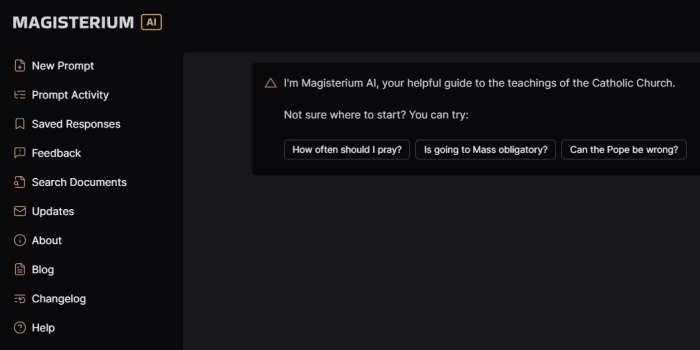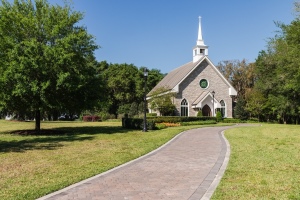Catholic AI chatbot used by over 180K people to ‘ensure fidelity to Church teaching’

An artificial intelligence chatbot program aimed at helping people learn more about the Roman Catholic Church teachings is being used by over 180,000 people across 165 countries.
Magisterium AI was launched last July and seeks to answer questions people have about Catholic teaching by drawing from thousands of Catholic documents.
Matthew Harvey Sanders, founder and CEO of Longbeard, the technology company that helped build Magisterium AI, told The Christian Post on Thursday that the "market response" to the bot program "has been very encouraging."
"Within six weeks, Magisterium AI was being used in over 150 countries. That number has now grown to 165 countries," he explained. "Over 180,000 people from around the world are using Magisterium AI."
"Users range from bishops to high school students. User growth continues to be steady. And in recent months, we have seen an acceleration. All this growth has been organic or through earned media."

Sanders believes AI programming "has the potential to be one of the greatest boons for the Church since the printing press" and can "eventually help us level up our spiritual lives."
Nevertheless, Sanders cautions that "an AI system that is not specifically built to ensure fidelity to church teaching could cause significant harm."
"When ChatGPT launched, we became aware that Catholics were using it to answer questions on church teaching," he noted. "Given the system's high likelihood to hallucinate and its lack of transparency as to what documents it references in generating responses, we felt we had to act."
"So, we investigated if it would be possible to build an AI system that ensured greater fidelity to Church teaching and fortunately, with some hard work, we discovered it was indeed possible."
Sanders said that developing Magisterium AI and its sister program, Vulgate AI, was a "challenge" that has been "very rewarding," noting that it is "immensely motivating witnessing Magisterium AI's development progress from launch to today."
"We launched Magisterium AI with a knowledge base of over 600 of the most important magisterial documents. The knowledge base has now grown to well over 8,000 documents," Sanders said.
"Everything from church council documents to the Bible, the works of the Church Fathers, etc. With Vulgate, we now have the ability to digitize libraries at scale."
Sanders' company is working on a pilot program with the Pontifical Oriental Institute and Salesian Pontifical University to help digitally preserve important library items, which will eventually be available via Magisterium AI.
The AI program has been well-received within the Catholic Church, having recently been endorsed by Bishop John Arnold from the Roman Catholic Bishops' Conference of England and Wales.
"It has the technical ability to give you exactly what you're looking for in an instant, instead of wondering through a library and looking through thousands of pages, hoping that what you want is in a particular volume," said Arnold in a statement released earlier this month.
"It's not changing learning, and it's not dictating anything that hasn't been approved as being Magisterium of the Church. It's simply keeping in a store, in an enormous bank with wonderful search facilities, what the teaching of the Church is and how that applies to us. That's a real asset, but it's not intelligence."
The use of AI in a Christian context has drawn mixed reactions. A Barna Group study last November found that 51% of respondents disagreed with the idea that "AI is good for the Christian Church," while 22% said they agreed and 27% said they did not know.
Regarding concerns Christians may have with AI, Sanders told CP that, as with any tool or instrument, AI "could be used to build the world up or tear it down."
"AI is already changing our world, and I am concerned that not enough is being done to mitigate its downside," he replied. "Despite the challenges ahead posed by AI disruption, it's important we always remember AI is a tool."
"As such, we have to decide as a Church if we are going to use this tool to spread the Gospel or leave it on the table. In the same way, the Church moved swiftly to embrace the printing press, I foresee the Church will inevitably embrace AI."




























